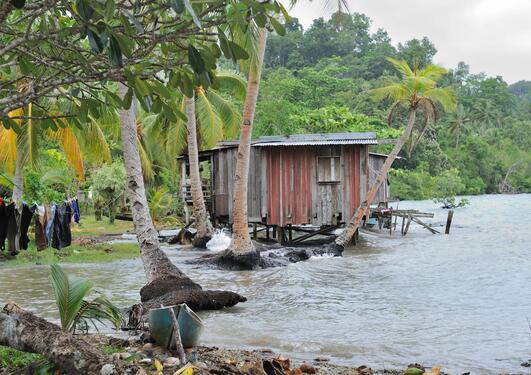The Rising Ocean: The Pacific Islands and Global Climate Change
The international symposium “The Rising Ocean: the Pacific Islands and Global Climate Change” 29 May 2015.
Main content
Global climate change and its effects worldwide are the most significant challenge of our time. Perhaps nowhere else are the effects of global warming and sea level rise as acute as in the Pacific Islands region, where four states consisting entirely of low-lying islands face the prospect of losing their sovereign land to sea level rise, and where extreme weather, coastal inundation, coral bleaching and ocean acidification threaten food security in most other island nations. Quite simply, the island nations of the tropical Pacific contribute the least to global warming, but are set to suffer the most from its effects, as seen by what takes place in the region already. The ecological, economic, political and social challenges faced by Pacific Islanders in the age of climate change and sea level rise require new approaches that combine the perspectives of climate science, international law and Pacific studies with the experiences learned and solutions proposed by islanders themselves. New forms of dialogue between policy makers in north and south must also be developed to address these urgent matters.
At the University of Bergen, climate change is a long-term research focus, as exemplified by the large-scale, eminent Bjerknes Centre for Climate Research and by research activities in a wide range of other disciplines such as the Bergen Pacific Studies group. The Bjerknes Centre and Bergen Pacific Studies are co-organizers of this major symposium on 29 May 2015, scheduled to coincide with the European premiere later in the day of the new Pacific drama ‘Moana: The Rising of the Sea’, performed by 30 dancers and singers from the University of the South Pacific and produced by the EU-funded ECOPAS climate change project, coordinated by the University of Bergen. In the “Moana” performance, the ensemble of Pacific Islanders demonstrates, through forceful visual and emotional messages, how they themselves see their lives as tropical islanders threatened by global climate change.
The symposium will address the particular challenges faced by the islanders and nations of the Pacific through presentations by climate scientists, law specialists, Pacific studies scholars, prominent policy- makers and artists from the Pacific, and representatives of the governments of Norway and other industrialized nations. Culminating in an emotionally charged stage performance on climate change by Pacific Islanders themselves, the day is envisaged as opening up for new forms of dialogue that generate entirely fresh perspectives for action.

